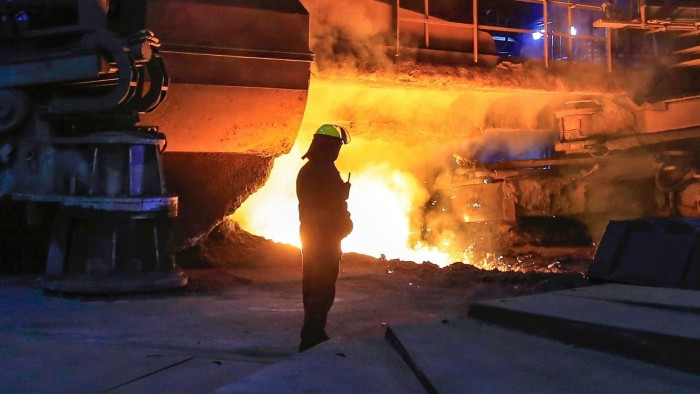Unlock the Editor’s Digest for free
Roula Khalaf, Editor of the FT, selects her favourite stories in this weekly newsletter.
British Steel has set out plans to close its two blast furnaces as early as June, leading to the loss of thousands of jobs, after the Chinese-owned steelmaker turned down an offer of taxpayer support.
The steelmaker told workers on Thursday morning that it would start consultations on job losses, putting at risk between 2,000 and 2,700 jobs at the company’s flagship site in Scunthorpe, Lincolnshire. The business employs about 3,500 people in the UK across three sites.
The business’s Chinese owner Jingye on Wednesday rejected an offer of £500mn from ministers to help it move to greener forms of steelmaking, despite almost two years of talks.
Ministers are considering “all options” including a nationalisation of the business, energy minister Sarah Jones told the House of Commons on Thursday.
“Our preferred approach by far is that British Steel come back to the table with us, talk about the offer on the table, and that we have that private investment in the future,” she said.
“I call on the company to reconsider its plan . . . and accept our generous offer which remains on the table.”
The government has deemed steelmaking to be strategically important to the UK, and last year set aside £2.5bn to safeguard the future of the industry.
Officials last year said nationalising British Steel was an option if no private buyer could be found.
British Steel — the last remaining operator of UK blast furnaces after Tata Steel closed down its Port Talbot furnaces — said it would continue to engage with ministers to try to reach an agreement.
The consultation would propose three options: closing the two blast furnaces and associated facilities by early June, by September, or at a “future point beyond September”, the company said.
Talks with the government had centred on funding a move to less carbon-intensive electric arc furnaces. Under the first scenario being consulted on, the company would also abandon those plans entirely.
British Steel’s chief executive, Zengwei An, said the company believed “this is a necessary decision given the hugely challenging circumstances the business faces”.
“We remain committed to engaging with our workforce and unions, as well as our suppliers and customers during this time,” he added.
British Steel said: “Challenging market conditions and significant ongoing financial losses have made it unsustainable to continue operating the blast furnaces and wider steelmaking operations.”
The company blamed tariffs and “higher environmental costs” for its financial plight, which see it lose £700,000 a day despite having invested £1.2bn into the company since 2020.
Steel unions on Thursday urged the government and British Steel to restart talks.
Sharon Graham, general secretary at the Unite union, said the announcement on job losses was “quite simply a disgrace”.
British Steel was “guilty of trying to hold the government to ransom, while using its dedicated workforce as pawns”, she added.
Graham said the government had “made an offer to invest heavily” in the company.
“This offer comes with long-term job guarantees, anything less would be a complete misuse of taxpayers’ money,” she added.
“This is a dark day for our steel industry and for our country,” said Roy Rickhuss, general secretary at the Community steel union. “We urge Jingye and the UK government to get back around the table to resume negotiations before it is too late.”
Alasdair McDiarmid, assistant general secretary at Community, said there were “huge national security implications at stake”. The closure of Scunthorpe would mean the UK “losing its only primary steelmaking capacity”.
“That would be unthinkable at a time when investment in defence infrastructure is such a pressing priority for Britain and our democratic allies in the west,” he added.
Business secretary Jonathan Reynolds said: “I know this will be a deeply worrying time for staff and, while this is British Steel’s decision, we will continue working tirelessly to reach an agreement with the company’s owners to secure its future and protect taxpayers’ money.”
Read the full article here

